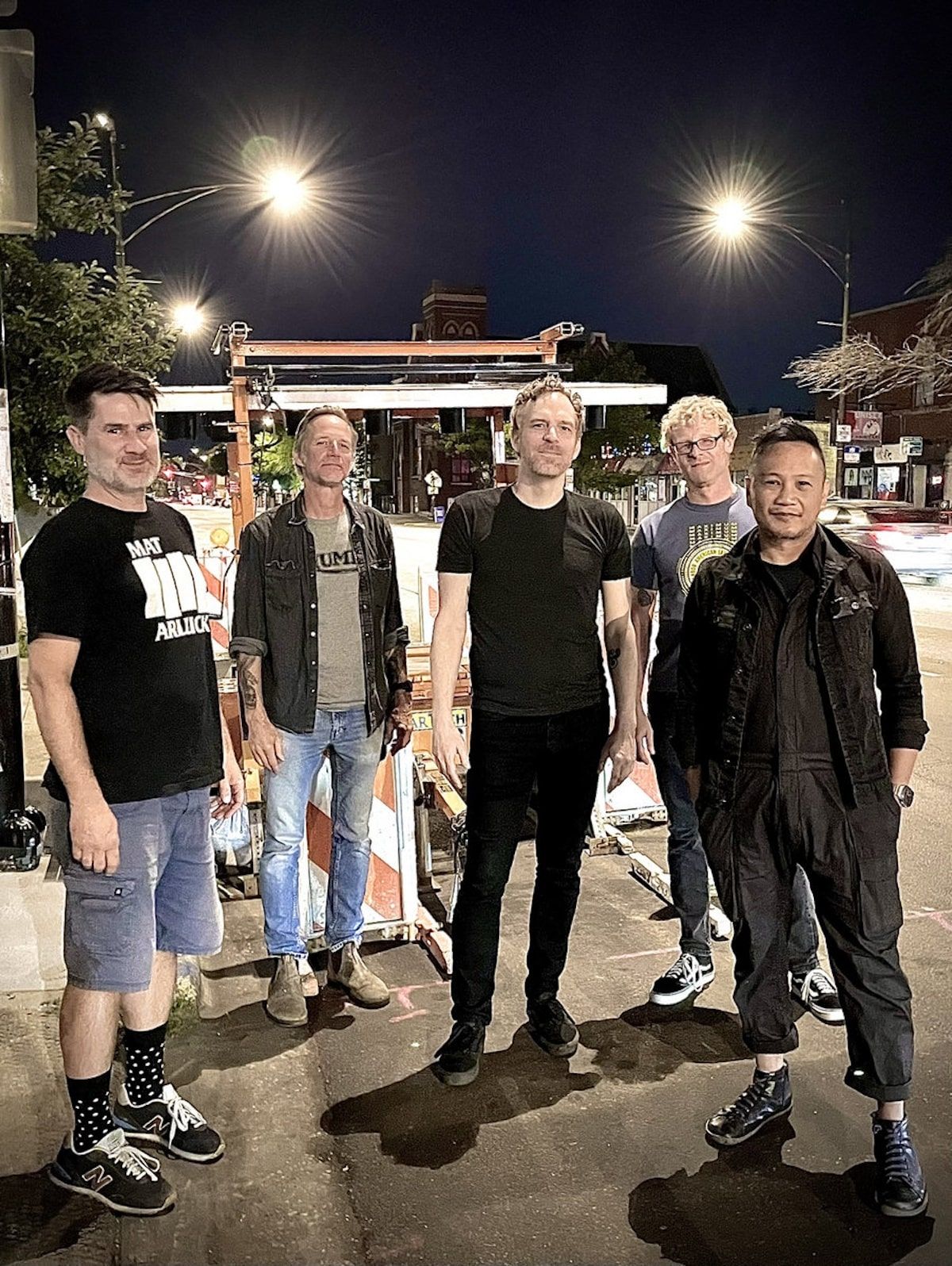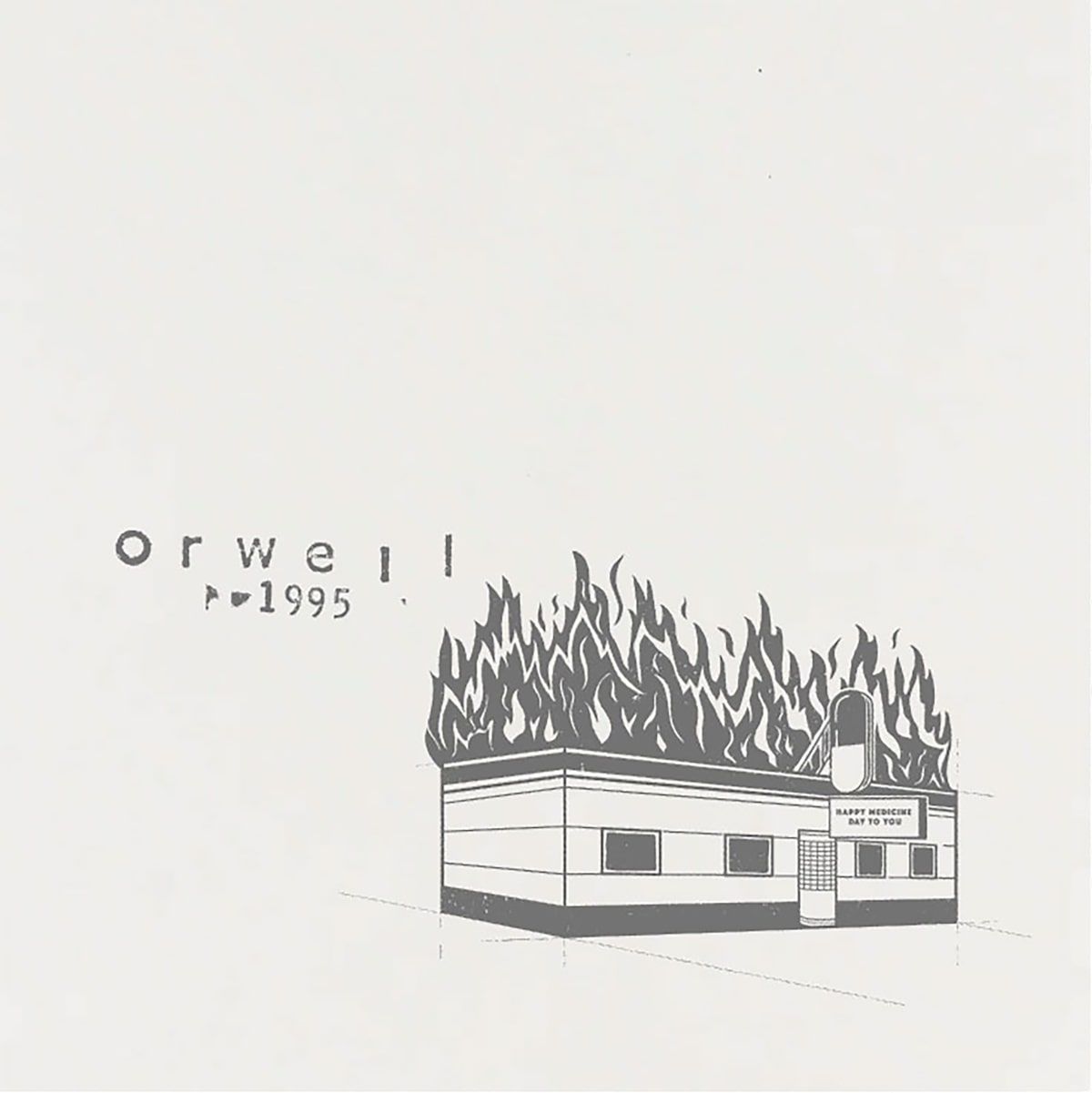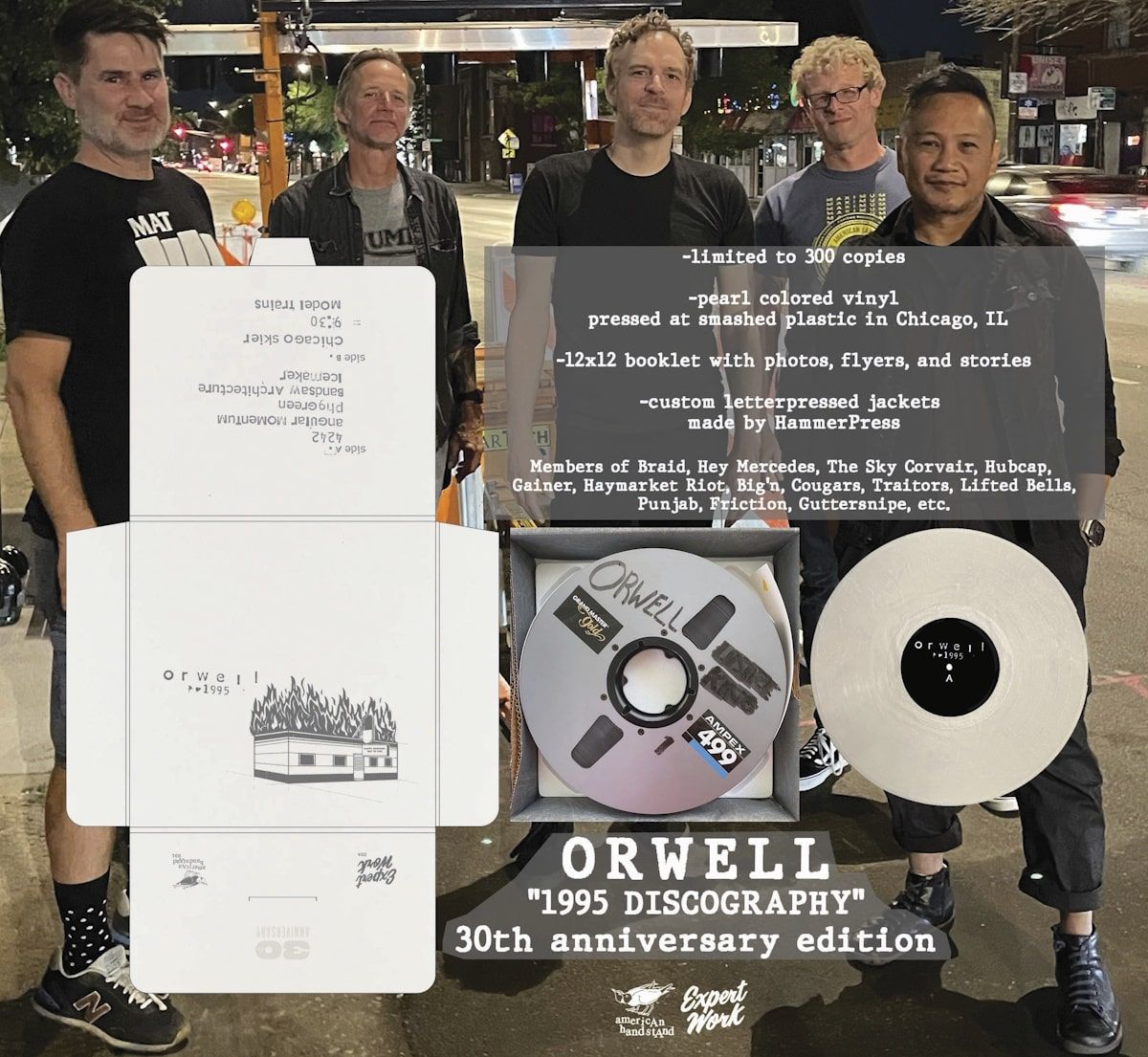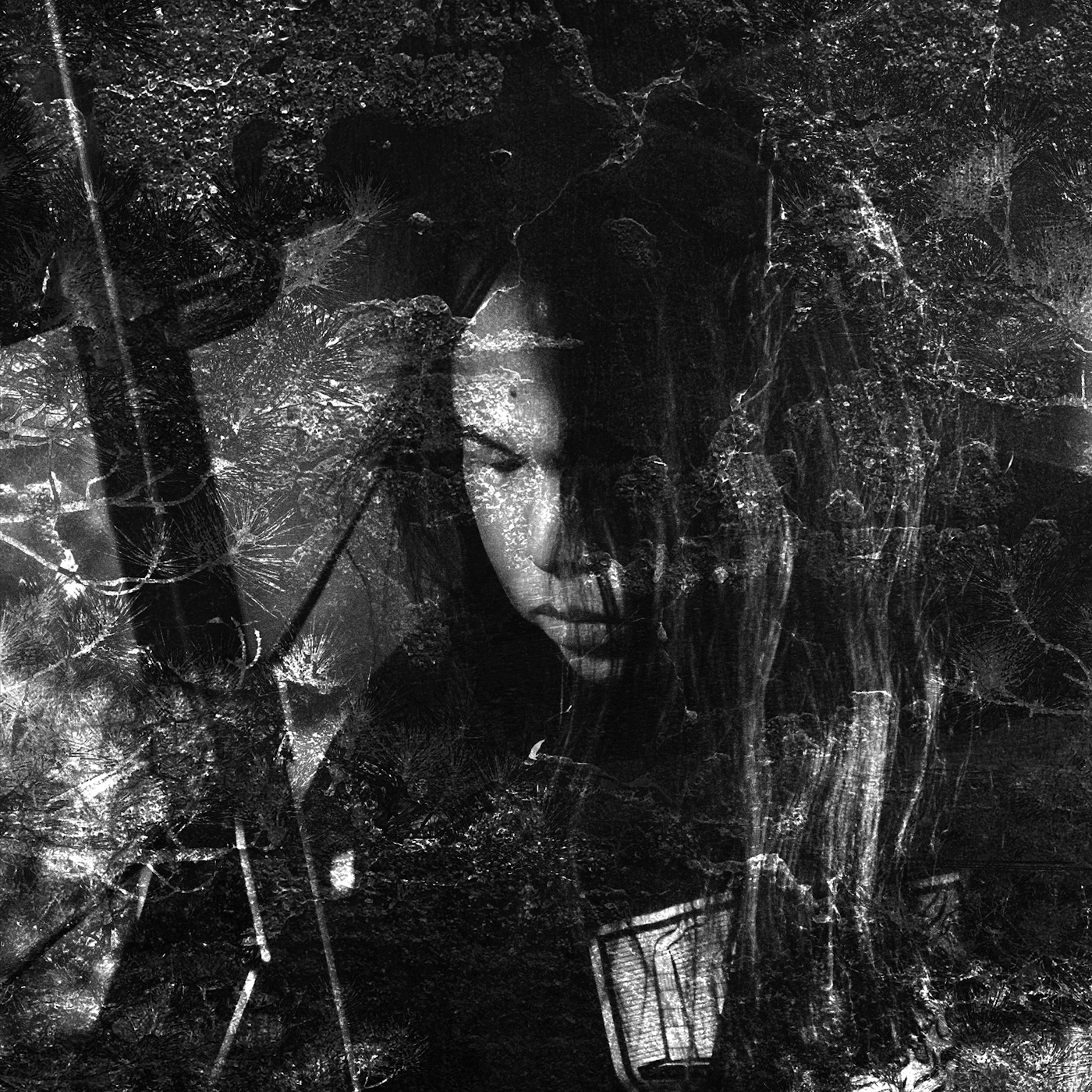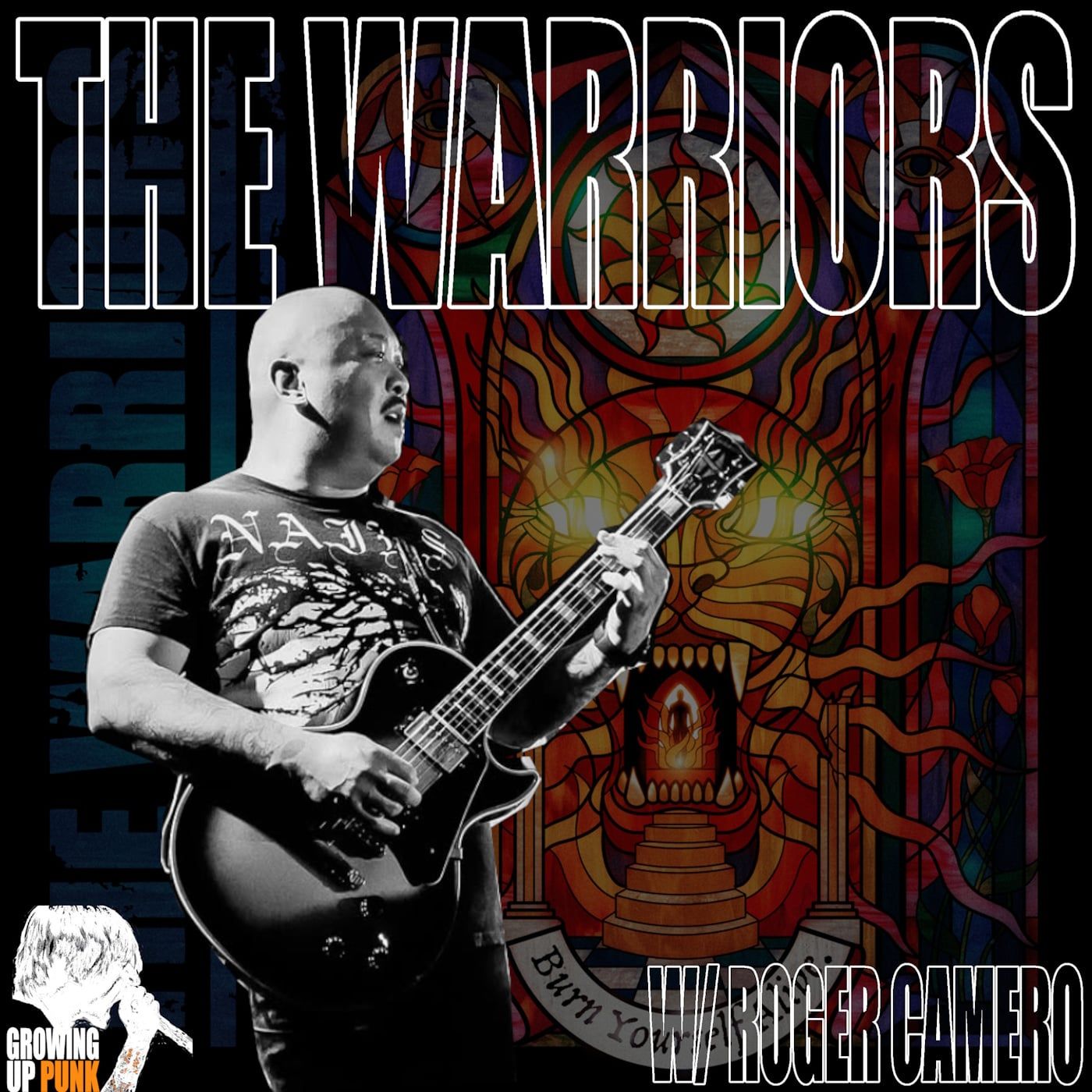For one short year in 1995, Orwell existed in the margins of Chicago’s post-hardcore and emo landscape, a footnote in the discographies of its members, most notably Bob Nanna (Braid, Hey Mercedes).
The band came together almost by accident—formed by musicians already juggling other projects, record labels, and college commitments. A handful of shows, a few compilation appearances, and eight recorded songs later, they vanished. Now, thirty years later, their brief existence gets another look with the reissue of Orwell: 1995, a complete discography pressed on pearl-colored vinyl with new packaging, a letterpressed jacket, and a 12×12 booklet featuring photos, flyers, and stories from the band. The pre-orders open on March 7th on Expert Work Records, with the official release set for April 4th.
Originally released in 2020 as a digital compilation, 1995 quickly sold out its initial physical run. This reissue marks not only the 30th anniversary of the band’s formation but also the first proper presentation of their recordings—now housed in packaging made by Hammer Press, the same company that worked with Crank! and Caulfield Records. The record is pressed at Smashed Plastic in Chicago, reinforcing the band’s deep ties to the city’s DIY scene.
View this post on Instagram
Orwell wasn’t meant to last. “We were just 21-year-olds trying to be like the bands we adored—Lync, Angel Hair, Hoover, Indian Summer,” recalls drummer Billy Smith. “We were sloppy as fuck live, out of tune, too fast, too excited, but that’s where the fun was.” Orwell functioned in the background of a scene already moving at breakneck speed. Bob Nanna, fresh off Friction, had just started Braid and was also playing in The Sky Corvair and Hubcap. Bassist Fred Popolo was running Divot Records and putting out Braid’s first album while playing in Gainer. Guitarists Sean O’Brien and Demetrio Maguigad were balancing multiple projects as well.
View this post on Instagram
With everyone pulled in different directions, their practices often took place without Nanna, who was studying at the University of Illinois in Urbana. “We’d record new songs on a boombox, send Bob the tape, and then he’d show up at a gig with lyrics ready,” Smith says. “It worked.” They played just a handful of shows, most notably in living rooms, basement spaces, and house venues, their energy chaotic but sincere. The band never took photos, leaving only a few memories and old tapes as proof of their existence.
Unlike Braid’s later melodic structures, Orwell’s sound was rougher, more aggressive—a product of youthful adrenaline rather than careful songwriting. “We had this thing we called ‘Rock Song,’” says Smith. “It was just an over-the-top, jumbled mess. That’s what Bandsaw Architecture was meant to be.” Of the eight recorded tracks, only three saw release in the ‘90s—4242 on the Emo Schmeemo 7”, Angular Momentum on the Polyvinyl Direction comp (CD-only), and Bandsaw Architecture on the Divot/Actionboy Ground Rule Double compilation. The remaining five tracks remained unreleased until 2020.
Recording was a process of scrappiness and chance. The first session happened at the old Electrical Audio house, with Tom Zaluckyj from Tar engineering, simply because bassist Fred Popolo had access through his internship. The second was at Attica Studios with Chuck Uchida, who was known for his work with Chicago punk and hardcore bands. The budget was non-existent, forcing them to record over an old Los Crudos tape to save money. “If you wanted to keep the tape, it was more money,” Smith laughs. “We didn’t have money.”
Orwell imploded before it ever properly started. “We just ran ourselves out of gas,” Smith says. The members moved on—Braid took off, Divot Records kept releasing records, and Chicago’s punk and emo scenes evolved. By the time the early 2000s emo revival began looking back on the ‘90s, Orwell had already faded into obscurity.
When the discography was compiled in 2020, it was less about nostalgia and more about preservation. “We didn’t even have proper mixes of some of the songs,” Popolo recalls. “I’d been holding onto a cassette of the rough mixes since ‘95. Finally, in 2020, Frank [Marino] gave it a proper mix, and it’s crazy to hear it as a ‘fresh’ session.”
For Nanna, the reissue was an unexpected full circle moment. “I never got around to finalizing lyrics for PH9 Green in ‘95,” he admits. “It took a stay-at-home mandate in 2020 to finally finish them.” The new mix also gave him a new perspective on his own vocal performance. “I think my voice sounds a lot better now than it did back then.”
The 30th anniversary edition of 1995 is about documenting a moment before it’s lost entirely. “This is just a small piece of music that means a lot to us,” Popolo says. “Hopefully, other folks get to enjoy it too.”
But don’t expect a reunion. “Orwell should just play in your living room with a keg and four other bands on a hot summer day,” Smith jokes. That’s where they belonged in ‘95, and that’s where they’ll stay—etched in the grooves of a long-overdue reissue, a snapshot of a time when DIY punk in Chicago was messy, fast, and fleeting.



